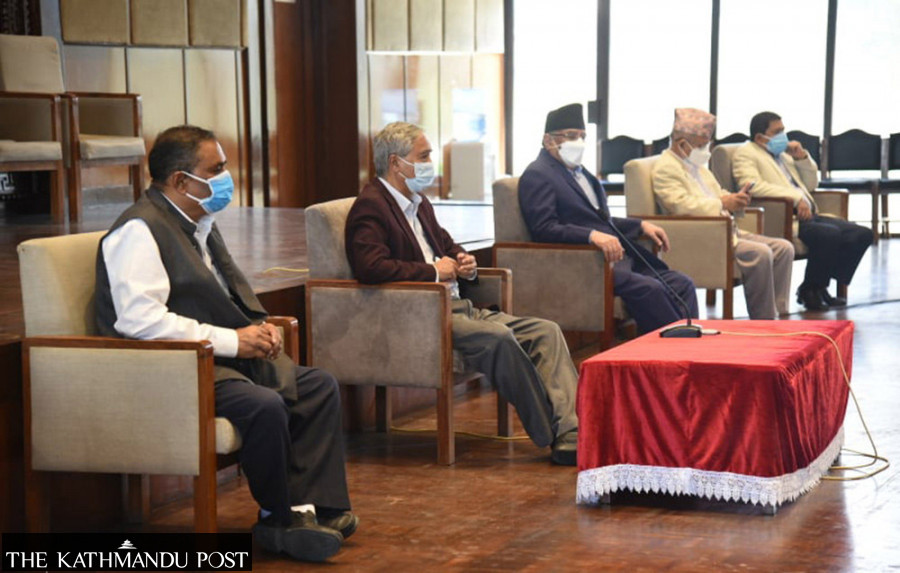Politics
Coalition partners eye alliance for upcoming polls, but there are complexities
There are more aspirants than the 165 lower house seats up for grabs and Maoist Centre and Unified Socialist want more seats than they have now.
Tika R Pradhan
The five-party ruling coalition partners have said they will soon hold an extensive meeting to evaluate last month’s local poll results.
This, according to party leaders, means the five-party coalition wants to continue their electoral alliance for the upcoming federal and provincial elections, due later this year.
“It’s more than clear that the five-party alliance will continue at least until the next federal and provincial polls,” said Pradeep Poudel, a central committee member of the Nepali Congress. “There is no doubt about that.”
There’s a general understanding in the Nepali Congress and the CPN (Maoist Centre) that the alliance largely helped the coalition. The CPN (Unified Socialist) and the Janata Samajbadi Party, however, are not quite happy. The fifth constituent, Rastriya Janamorcha does not have much leverage.
Party leaders agree that despite their intention to continue the alliance, there are complexities galore when it comes to seat-sharing.
And as Congress President and Prime Minister Sher Bahadur Deuba is in a bid to rope in the Loktantrik Samajbadi Party, there could be more aspirants than the number of seats up for grabs.
There are 165 seats for the House of Representatives and 330 for provincial assemblies under the first-past-the-post system.
The Congress is likely to keep at least 100 lower house seats for itself, leaving the 65 to be distributed among the coalition partners.
And here is the catch.
The Maoist Centre, which won 36 seats under the FPTP, has been eyeing at least 40 percent or 65 seats. The Unified Socialist which has 24 seats in the current House wants more.
Then there are the JSP and the LSP which have 12 and 9 seats, respectively, under the directly elected system.
Speaking at a function on Sunday, Unified Socialist chair Madhav Nepal said the federal and provincial polls will happen within the next six months and parties in the coalition should begin discussions on candidates.
“Now we need to start discussions on candidates for the polls,” Nepal said during an interaction with journalists.
Nepal went on to say that the electoral alliance would be easier in the federal and provincial polls.
“Local polls were complex. Comparatively, the alliance will be easier at the upper level,” Nepal told the editors. “As there are 165 seats in the federal parliament and 330 for provincial assemblies.”
Jagannath Khatiwada, spokesperson of the CPN (Unified Socialist), said that it’s obvious for them to demand more seats than they have now.
“We will begin discussions once we complete our Central Committee meeting scheduled for June 25,” he told the Post.
With the Nepali Congress having lots of aspirants, according to party insiders, party President Deuba will have a tough time managing them besides managing seats for coalition partners.
Some Nepali Congress leaders have said the coalition partners will continue with the electoral alliance by managing the seats even though it is quite complicated.
“The alliance will be forged with either the Janata Samabadi or the Loktantrik Samajbadi in Madhes and the parties will have a friendly competition where a single party can win independently,” said a Congress central member asking not to be named. “There will be an alliance among Nepali Congress, Maoist Centre and Unified Socialist throughout the country except in some places where prominent leaders are contesting.”
Where there are prominent figures like Mohan Basnet and Agni Sapkota in Sindhupalchok, the alliance may not be able to decide whom to field and therefore in such places parties could go for a friendly competition, the leader said.
Narayan Kaji Shrestha, a senior Maoist leader, who met CPN-UML chair KP Sharma Oli last week after the latter invited him for talks, said seat-sharing in the existing ruling coalition would be “extremely difficult.”
“Given the number of seats available and the aspirants we have, it is going to be difficult,” Shrestha told the Post.
During the local polls, the coalition was able to forge an electoral alliance in only one-third of the total 753 local units.
With many of the deputy chiefs of the major metropolitan cities and sub-metropolitan cities going to the UML as the votes could not be transferred properly and many votes were invalid, coalition partners like the Unified Socialist) and Janata Samajbadi are not happy.
However, they are not in a situation to quit the coalition.
“The voting pattern of the recent local polls has suggested that there is no alternative to contesting the elections under an alliance as the UML is still not weak,” said Khatiwada. “The UML got more votes because the Nepali Congress and the Maoists tried to relegate us.”
However, some key leaders of the ruling alliance claimed that there are complexities but they are manageable.
“We shared six metropolitan and 11 sub-metropolitan cities [in the local elections], and now we have 165 seats [to share in the parliamentary elections],” said Barshaman Pun, a senior leader of the Maoist Centre. “The most important thing is that we have decided to move ahead with the coalition.”
According to Pun, the existing coalition will work until the next polls “perfectly.”
“We have to start discussions on modalities though,” said Pun.




 21.12°C Kathmandu
21.12°C Kathmandu















